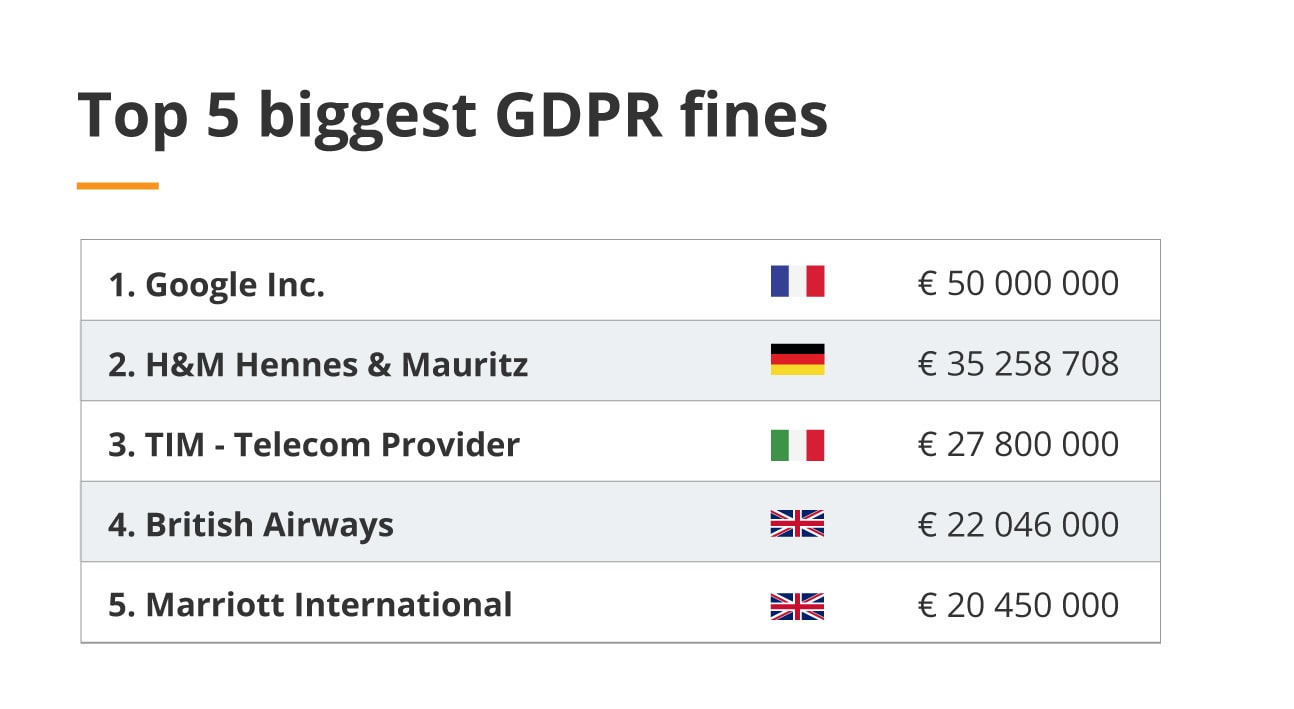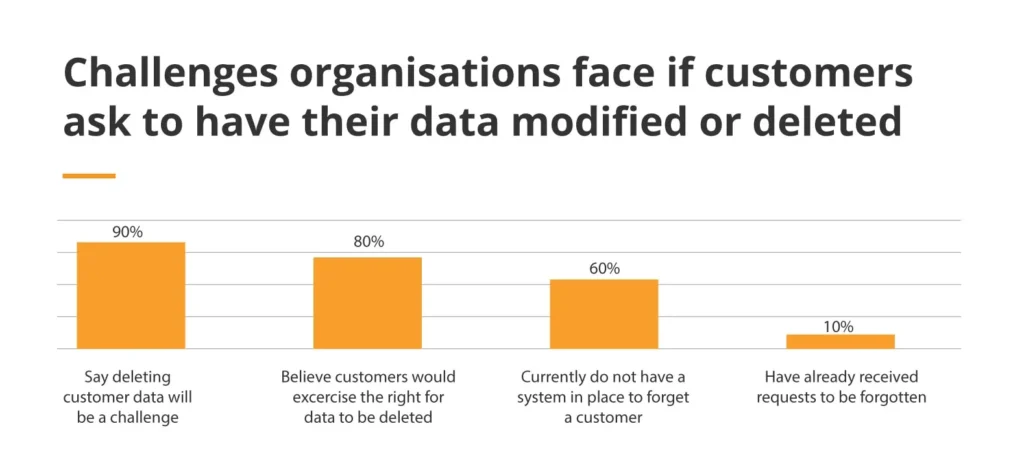
GDPR Compliance: Essential Principles and Tips for Your Business
Tough, strict and costly – this is a quick way to describe the General Data Protection Regulation (GDPR), which is probably the most controversial and far-reaching privacy and security law in the world.
What is GDPR, and why is data protection law important?
GDPR first came into effect in May 2018, and it caused quite a stir – not only within the European Union but across the globe – especially as globalisation and interconnected networks have led to businesses from different regions all wanting to collect personal data from EU citizens.
As mentioned above, the GDPR can be described as:
tough – because it was designed to guard and protect a wide variety of personal data;
strict – because the potential penalty or fine for a single violation can reach up to several million euros (€20 million or 4% of the organisation’s global revenue, whichever is higher)
costly – because it has forced many companies to rethink the way that they collect data, reinforce their systems, or even redesign their products and services.

Furthermore, the GDPR lacks specifics, leaving a lot of open to interpretation, making compliance a daunting (though still necessary) process for many business owners.
The vagueness of GDPR can be problematic to navigate. To comply with GDPR, companies need to understand the principles of processing personal data and make them a part of their business operations. Compliance is not just about avoiding fines but about adapting to a new data protection paradigm.
This adaptation can be challenging, but it also allows companies to differentiate themselves through responsible data practices, potentially gaining customer trust and loyalty in an increasingly privacy-conscious market. This is why, first and foremost, it is important to familiarise oneself with the principles of data processing, as they provide a starting point for further consideration and action.
Why was the General Data Protection Regulation introduced?
The main goal of the General Data Protection Regulation (GDPR) is to give individuals more control over their personal information and to strengthen their privacy rights in the digital era.
The secondary goal of GDPR is to revise the regulations governing data protection, privacy, and data portability. This was particularly important in the present-day context of digital marketing and big data analytics, where data handling has become increasingly complex.
Another objective of GDPR is to create uniform standards across all European Union countries, which was especially important for cross-border firms that had to navigate a fragmented legal environment.
Learn more about data privacy in the EU and USA:
Data security and privacy: the 50+ generation’s biggest concern
Cybersecurity in the EU — tighter regulations are coming — are you ready?
Where is GDPR used?
The General Data Protection Regulation is primarily used within the European Union (EU) and the European Economic Area (EEA). It applies to:
Organisations Based in the EU/EEA: Any company established in an EU or EEA country must comply with GDPR, regardless of where the data processing occurs.
Non-EU/EEA Organizations Targeting Individuals in the EU/EEA: The GDPR applies not only to organisations located in the EU and EEA but also to those outside these regions that offer goods or services to individuals in the EU/EEA or monitor their behaviour. This means that many international organisations, businesses and online services with a global user base must comply with GDPR.
Public Authorities and Bodies: Public sector organisations in the EU/EEA are also subject to GDPR.
Many countries outside the EU/EEA have implemented or are considering implementing data protection laws similar to GDPR. This shows that GDPR has a significant global impact. However, GDPR only applies directly to the EU/EEA and businesses that interact with individuals within this region.
Who benefits from GDPR?
EU data subjects and consumers are the main winners when it comes to GDPR because it gives them more rights over their personal data, like access, erasure, transfer, and personal data breach reporting, which improves their privacy.
Moreover, the Data Protection Authorities (DPAs) in each EU member state now have more authority to punish businesses that do not comply with data protection requirements.
And let’s not forget that GDPR further makes the European Union a world leader in data protection and privacy laws, placing pressure on other countries to adopt similar regulations.
But there, the business world has learnt to benefit from data processing regulations, too:
Businesses Emphasizing Data Protection: Data privacy is a competitive advantage that can help enterprises win customers’ confidence. Companies dealing with sensitive information should take compliance seriously since it shows they are reliable and responsible.
Legal and Consultancy Services: There has been a rise in the demand for the services of law firms, data cybersecurity solutions, and compliance consulting firms. They help other companies learn about and comply with GDPR.
Cybersecurity and IT Vendors: There’s a need for appropriate security solutions and IT infrastructure that complies with GDPR. Secure data processing and storage technologies are becoming increasingly important, which is good news for these service providers.
Innovators in Data Management: GDPR is a driving force behind new privacy and data management software developments. The GDPR has opened up a new market for companies that provide innovative solutions to the problems of data security, privacy, and compliance.
What are the 7 main principles of GDPR?
There are 7 fundamental data protection principles underlying European personal data relating procedures. These principles establish the standards for organisations dealing with individuals’ rights and privacy.
1. Lawfulness, fairness and transparency
Lawfulness means that you need to have a valid reason to collect, store and process personal data from citizens of the European Union, which is the main requirement of the GDPR.
For example, you may need some personal data to create a contract, protect public interests, or fulfil a legal obligation. In each case, users must first give you consent before you can use any of their personal information.
Transparency means that users have to be fully aware of why and how you are using their personal data. And, of course, they should be informed about these purposes and methods of collecting, storing and processing their data before you take any action, not afterwards.
Fairness means that you need to uphold the promise you’ve made to your users without any fear of stretching or misusing the terms of the agreement.
2. Purpose limitation
As stated in the GDPR, you can only collect data for “specified, explicit and legitimate purposes”. This means that you need to clearly communicate in the privacy notice what you are going to use the data for and make sure that you do not use it for any other purposes without asking for additional consent.
Of course, you have a lot more leeway if you want to archive data in the public interest, for example, for statistical or scientific purposes.
3. Minimal data collection
You are permitted to collect and process only the minimal amount of personal data that you need to achieve your purposes and no more. For example, if you want to send out a newsletter, asking for more than just an email address would be inappropriate.
This, incidentally, also makes it easier to store data, and in case a data breach should occur, there are then much fewer pieces of sensitive information that may be leaked. Collecting minimal amounts of data is beneficial for both users and companies despite sounding unnecessarily restrictive for the latter.
Organisations always aim to know everything about their current and potential customers, and the GDPR just prevents things from spinning out of control.
4. Accuracy
Personal information must always be kept up-to-date. Any outdated or inaccurate data must be removed from the organisation’s systems immediately. That’s why regular audits of your data stores are a must.
And you also have to remember that your users may ask you to erase any information you have on them within 30 days, starting from the day they make this request. Plus, they have the right to rectify incomplete or inaccurate information.

5. Storage limitation
You are obligated by the GDPR to set up a standard time period for the storage of data that you need and actively use. Of course, this raises questions about defining whether you need certain pieces of data and how long you can consider an individual your customer or user.
In complex cases, consulting with a legal professional or data protection officer may be inevitable.
6. Integrity and confidentiality
This one requires you to protect the data that you are storing against “unlawful processing or accidental loss, destruction or damage”. This principle is vague when it comes to the measures you should take to secure your data, especially since the technology is developing rapidly, so the tools and practices used need to be constantly updated.
However, you may want to consider, for example, getting the ISO 27001 certificate to demonstrate your due diligence in cybersecurity.
7. Accountability
Documentation is key here. You need to be able to prove your compliance with the GDPR standards, so you better have all of your data collection, storage and processing policies on paper.
Record every step you take, collect evidence, and be prepared to justify your actions at any time whenever you are asked to do so by the authorities or data controllers – the potential consequences, in the form of a very costly fine, may be devastating to your company.
Adapting to GDPR: practical tips for seamless integration
It’s been a few years since the GDPR has gone into effect, so the majority of companies have already managed to handle most of the personal, data-related issues.
However, as technology progresses, cybersecurity trends evolve, and new products and services are introduced to the market. You may still find yourself needing legal as well as technical audits and consultations to help you make sure that you’re doing everything right.
As businesses adapt to ongoing technological advancements and evolving cybersecurity trends, Future Processing can offer the necessary support and expertise. Our services include regular assessments and updates to data protection strategies, ensuring compliance with regulations.
So, if you have any doubts or questions about dealing with the GDPR, don’t hesitate to contact us, and we will be happy to help you strengthen your systems and policies and protect you from any data leaks.



